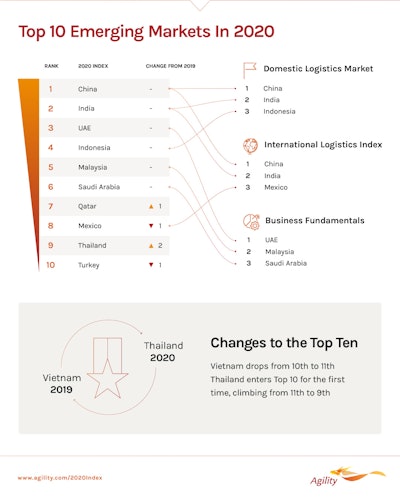
Supply chain industry executives anticipate a recession in 2020 amid concerns about downward pressure on global trade volumes, uncertain growth prospects, and ongoing friction between the U.S. and China.
Sixty-four percent of industry professionals surveyed for the 2020 Agility Emerging Markets Logistics Index say a recession is likely in the next 12 months. Only 12% of the 780 respondents say a recession is unlikely.
At the same time, most logistics executives say their companies will ride out any turbulence in trade relations between the world’s two largest economies. Seventy-percent of those with operations and investments in China say they will stay put and that their plans are unchanged despite the U.S.-China trade battle.
If they were to move production or sourcing from China, Vietnam and India were respondents’ top choices of places to relocate. They identified rising trade barriers as the factor most likely to hurt emerging markets growth.
The survey is part of the 2020 Agility Emerging Markets Logistics Index, the company’s 11th annual snapshot of industry sentiment and ranking of the world’s 50 leading emerging markets. The Index is a broad gauge of countries’ competitiveness based on their international and domestic logistics strengths and business fundamentals.
“The fears of a recession are not to be taken lightly, especially because of uncertainty about the impact of the coronavirus outbreak,” says Essa Al-Saleh, CEO of Agility Global Logistics. “A positive sign, however, is that a large number of emerging markets economies were able to weather an array of issues -- political and social unrest, structural problems, even international sanctions for some -- without losing much ground in the past year.”
The Index ranks 50 countries by factors that make them attractive to logistics providers, freight forwarders, shipping lines, air cargo carriers and distributors. In 2020, the top 10 emerging markets are: China, India, United Arab Emirates, Indonesia, Malaysia, Saudi Arabia, Qatar, Mexico, Thailand and Turkey.
China, India and Indonesia rank highest for domestic logistics; China, India and Mexico are top for international logistics; and UAE, Malaysia and Saudi Arabia have the best business fundamentals.
2020 Index and Survey Highlights
- China and India, atop the 2020 rankings based on their size and strength as international and domestic logistics markets, lag behind smaller rivals in business fundamentals, a category that ranks countries based on regulatory environment, credit and debt dynamics, contract enforcement, anti-corruption safeguards, price stability and market access. In that area, China ranks No. 8 and India is No. 18.
- The strongest clusters of emerging markets are in the Arabian Gulf and Southeast Asia, thanks to business-friendly conditions and core strengths – the Gulf’s energy wealth and Southeast Asian manufacturing power – that draw logistics activity. In the Gulf, UAE (No. 3), Saudi Arabia (6), Qatar (7), Oman (14), Bahrain (15) and Kuwait (19) rank among the most business-friendly emerging markets. Among ASEAN countries, Indonesia (4), Malaysia (5), Thailand (9), and Vietnam (11) are strong.
- Survey respondents see India as the market with greatest potential over China, their second choice. In rankings of best business conditions, several countries are making big moves: Egypt climbs 10 spots to #17; Ukraine jumps 10 spots to #27; Ghana drops 13 spots to #32; and Iran tumbles 12 spots to #38.
- Forty-two percent of those surveyed say a prolonged trade standoff between the U.S. and China could benefit Southeast Asian countries, which offer manufacturing and sourcing alternatives to China. This is less, however, than 56% who said last year that Southeast Asia would benefit.
- Egypt, despite a brief period of social unrest in 2019, showed significant gains across all indices. On the overall index, Egypt rose six spots to No. 20, while leaping 10 spots on the business fundamentals chart (17), six spots on the domestic opportunities index (13) and jumping five spots on the international opportunities index (23).
- The top three factors that keep small businesses out of global trade are trade bureaucracy (17%), government/border instability (14%) and inability to compete with larger rivals (14%), supply chain professionals say in the survey.
- Despite the belief a recession is likely, emerging markets still grew an estimated 3.7% in 2019 and are projected by the IMF to grow 4.4% in 2020. As for what is driving emerging markets growth, 23% say modernization of customs systems and processes, 18% cite increased internet penetration, 16% say modernization of logistics provider systems (WMS, TMS, etc.) and 15% mention increased adoption and modernization of online payment systems.
- The top five “megacity” emerging markets logistics hubs are Shanghai, New Delhi, Sao Paulo, Jakarta and Mexico City. Megacities – urban centers with populations of 10 million or more – require vast logistics support to meet domestic needs and engage in trade.
- E-commerce fulfillment is the top choice among logistics services expected to maintain or improve growth, well ahead of other services such as domestic last-mile delivery and international express parcel delivery.
- The countries with the least potential as logistics markets in 2020 are Syria, Iran, Venezuela, Iraq and Libya, according to the survey.

















